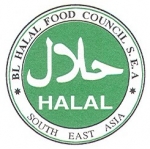Apr 09, 2006
PM Visited Our Goat Farm
Our Prime Minister visited our associated goat farm at Serting.
Here's a Bernama news report on the visit. The guy on the left with sunglasses in the accompanying photo is HS Wong. The white haired guy on the right is the CEO of Gema Padu group, the major shareholder of the farm, Major (rtn) Ng Bon Chong.
http://www.geocities.com/dqcleanchicken2/pmvisitbernama.h...
19:00 Posted in Visitors | Permalink | Comments (0)
Certified Organic - One of 5 only
We are one of only 5 farms certified organic by our Ministry of Agriculture.
See the full list here:
http://www.geocities.com/dqcleanchicken2/OrganicFarms/org...
18:56 Posted in Blog | Permalink | Comments (0)
Feb 21, 2006
Avian Flu
Here's our comments on the local incident of avian flu reported in the media:
http://www.geocities.com/dqcleanchicken2/avianflulatest.h...
15:46 Posted in Chickens | Permalink | Comments (0)
Halal
Our chickens are now certified "Halal" by an independent body, BL Halal Food Council S.E.A.
They have also awarded us their "Bersih" and "Suci" mark. 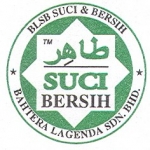 These marks reflect our farming practises which are free from chemicals and pollution and does not harm the environment. The awarding of the marks take into consideration that the chickens are not fed animal protein and are processed in a hygenic and sanitary manner.
These marks reflect our farming practises which are free from chemicals and pollution and does not harm the environment. The awarding of the marks take into consideration that the chickens are not fed animal protein and are processed in a hygenic and sanitary manner.
Click here to view the certificate:
http://www.geocities.com/dqcleanchicken2/scan0007a.jpg
15:10 Posted in Chickens | Permalink | Comments (0)
Jan 06, 2006
We are Certified!
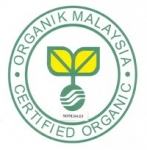 It's official, our farm now is a Certified Organic Farm. Certifying Body is Ministry of Agriculture. Standard is Skim Organic Malaysia under the National Organic Standards MS 1529: 2001. These standards are in line with international standards under IFOAM.
It's official, our farm now is a Certified Organic Farm. Certifying Body is Ministry of Agriculture. Standard is Skim Organic Malaysia under the National Organic Standards MS 1529: 2001. These standards are in line with international standards under IFOAM.
Here's a copy of the letter from the Ministry.
http://www.geocities.com/dqcleanchicken2/somletterconfirm...
16:00 Posted in Blog | Permalink | Comments (0) | Tags: Organic Farming
Dec 27, 2005
Cooked DQ Chicken Meals
Our range of home-cooked DQ Chicken dishes are gaining in popularity. Do not expect gourmet restaurant flavours, that's not what we are selling. We aim for home-cooked flavours; dishes that you will not mind having for dinner,
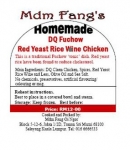
every other day or so.
Our best seller now is DQ Mushroom Chicken Stew. At RM23 a box suitable for 2 to 3 persons, it is a bargain. All ingredients used are natural.
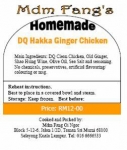
Next comes two traditional recipes, Hakka Ginger Chicken and Fuchow Red Yeast Rice Wine Chicken. Home-cooked by Mdm. Fang Oi Ngor, these two dishes come in smaller packs suitable for 1 to 2 persons, even three if you are having your own dishes. Each sells for RM12 and is value for money.
On the pipeline is Rendang Betawi cooked by Mak Sa'ad Binti Haji Adam. We are waiting as anxiously as many of our customers are for this gem (it is GOOD!).

22:45 Posted in Blog | Permalink | Comments (0)
Nov 27, 2005
Bird Flu - Can Malaysia Learn from other's mistakes?
Here's what Prof. Peter Singer, professor of bioethics at Princeton University has to say about the bird flu:
http://www.geocities.com/dqcleanchicken2/PeterSinger/Fact...
Tell your friends, if they support factory farming or intensive farming, whether directly or indirectly by opting to buy their "cheaper", sanitised and cosmetically better looking produce, you may end up paying far far more than the little extra that organic farmers are asking for, in the long run. The avian flu is just one example. The previous example was nipah.
Tell your local assemblyman to stop supporting initiatives by lobby groups to have the government introduce more and more sanitised intensive farming policies and easing out the "real" farmers - those who farm traditionally and with respect for the land and the animals.
13:15 | Permalink | Comments (0)
Nov 12, 2005
Rendang Betawi - Heritage Receipe

An enterprising lady, Mak Saah Binti Hj. Adam, has approached us to use DQ Chickens for home-cooked rendang using a family receipe. We have tried it and it tastes great. She’s still working out the pricing but we are so pleased with the results, we have decided to inform our customers first and if you are keen, to book in advance.
Following our standards, no preservatives or chemicals are used. The only cooking oil used is olive oil.
These are the ingredients: old ginger roots, garlic, shallots, lemon grass, galangal roots, coriander, cumin, star anise, fennel, cinnamon, cardamom, fresh turmeric roots, fresh turmeric leaves, limau purut leaves, black pepper, kerisik (coconut), bird’s eye chillies, red chillies, coconut milk, candlenuts, tamarind, palm sugar and sea salt. Phew! Plus one or two other “secret” ingredients.
Wherever possible, fresh ingredients will be from our farm.
21:20 Posted in Blog | Permalink | Comments (2)
Nov 03, 2005
Felis Bengalensis
 Felix the Felis Bengalensis came avisiting every night, having a chicken for dinner. Well, we are losing some 100 birds a month, so there must be a family around. Anyway, this one is going to Taman Negara.
Felix the Felis Bengalensis came avisiting every night, having a chicken for dinner. Well, we are losing some 100 birds a month, so there must be a family around. Anyway, this one is going to Taman Negara.
(Yes, she is the same kucing batu that breeders use to cross with the local domestic to produce the Bengal breed).
20:35 Posted in Blog | Permalink | Comments (0)
Oct 24, 2005
Avian Flu - How Worried Should I Be?
Many customers have called our office and asked, “how worried should I be about avian flu? Should I still be eating chicken?”:
There are two areas of concern. One is the H5N1 avian flu as reported in the media – a disease affecting birds with high mortality and which very rarely infects humans causing similarly high mortality. The second concern is the possibility of a mutated avian flu spreading from human to human.
The first concern – the chances of the average Malaysian being infected by avian flu is very slim. If we were to look at the situation objectively, in spite of millions of birds being killed and the number of countries affected since it first surfaced in Hong Kong in 1997, the total humans affected thus far is in the region of about 120 persons with about 60 mortality. Compare this to SARS or to Nipah.
All those killed by the avian flu were those with direct contact with live chickens. They were either involved in the culling of sick birds, or butchered sick birds to cook. One must remember in many poorer Asian countries birds that are obviously sick are still slaughtered and cooked. In 2004, two siblings in a Vietnamese family died after butchering 10 sick chickens for a wedding dinner. None of the guests or other members of the family who ate the cooked chickens came down with the disease.
It is not the practice in Malaysia to sell or to eat diseased chickens. The signs of disease in a chicken with avian flu are obvious and cannot be passed off as healthy, ie those people who died from butchering sick birds for food knew the birds were sick though they may not have been aware of the consequences. Further, most Malaysian families do not buy live birds and therefore are not involved in butchering live birds.
For ease of mind, buy your chickens from a farm that is visited regularly by vets (as is the case with DQ Farm), and avoid buying live birds at the wet market or have live birds delivered to your homes.
The second concern – the mutated avian flu that will spread from human to human. If such a mutation occurs, you won’t be getting the flu from chickens but from another human being. Eating chickens will not increase or decrease your chances of catching such a flu, if it should happen. You are better off avoiding crowds. Better yet, have DQ Chickens delivered to your home and boost up your immune system with home-made DQ Chicken essence of chicken.
In the event of human to human avian flu, we would suggest stocking up on N95 face masks as these masks will filter off even flu viruses. It can be used for up to 8 hours continuously before changing.
09:20 Posted in Chickens | Permalink | Comments (0) | Tags: Organic Farming








